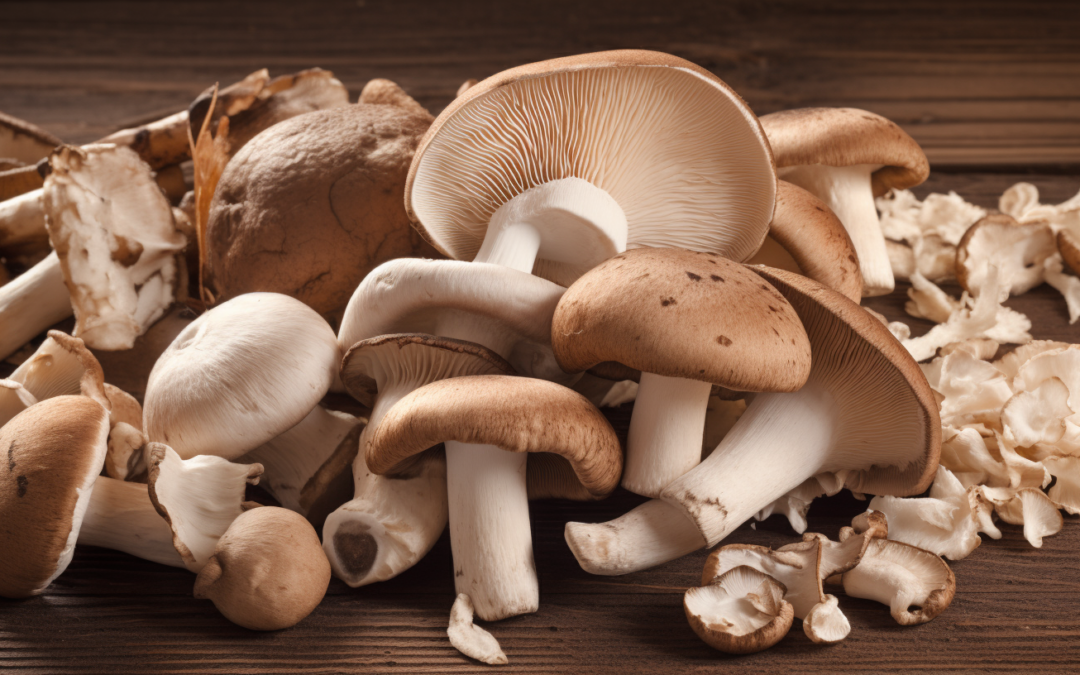Mushrooms and Their Health Benefits
From time immemorial, humans have forged an intricate relationship with the mushroom – a humble inhabitant of the undergrowth. Emanating from the kingdom of fungi, mushrooms are a culinary delight savored across global cultures. Beyond their palatable virtues, they also pack a potent nutritional punch. As a mycologist and nutritionist, let’s embark on a journey through the annals of history and explore the health benefits of different types of mushrooms.
Mushrooms: A Historical Perspective
The roots of human interaction with mushrooms extend to prehistoric times. Evidence of their use dates back at least 19,000 years to North Africa, as represented in rock paintings in the Tassili caves of Algeria. Early humans likely recognized their nutritional and medicinal values intuitively, incorporating them into their diet and healthcare regimen.
In the East, particularly in China, mushrooms were regarded as elixirs of longevity. The Reishi (Ganoderma lucidum) mushroom, often referred to as the “Mushroom of Immortality”, was a precious component of traditional Chinese medicine, known for its myriad health benefits.
The Greco-Roman civilization held a similar reverence for mushrooms, even attributing divine attributes to them. The Romans considered the consumption of certain mushrooms as a privilege of the nobility, while the Greeks associated them with strength, believing that they provided warriors with extra vigor during battles.
Fast forward to the 20th century, fungi cultivation emerged as a science. During World War II, due to food scarcity, mushroom farming gained prominence, particularly in Paris. The catacombs beneath the city served as the perfect breeding ground for champignons. Since then, the mushroom industry has blossomed across the globe.
The Health Benefits of Different Types of Mushrooms
Now, as we delve into the world of mushrooms from a nutritional standpoint, it’s important to note that different types of mushrooms have distinct nutrient profiles and health benefits. Here are a few notable ones:
White Button Mushrooms (Agaricus bisporus):
This common mushroom contains selenium, an antioxidant that protects body cells from damage, and B-vitamins, essential for energy production and brain health. Recent research also suggests that they may boost the immune system and inhibit certain cancer cells.
Shiitake Mushrooms (Lentinula edodes):
Prized in Asian cuisine, Shiitakes are rich in polysaccharides, specifically lentinan, which has been associated with improved immunity and anticancer properties. They also contain a good dose of vitamin D, vital for bone health and immune function.
Reishi Mushrooms (Ganoderma lucidum):
Often consumed in a tea or extract form, Reishi mushrooms are associated with immune modulation, stress reduction, and longevity. They are rich in beta-glucans, polysaccharides known for their immune-enhancing properties.
Lion’s Mane (Hericium erinaceus):
This unique mushroom, resembling a white waterfall of icicles, has shown promise in supporting cognitive health. Compounds within Lion’s Mane stimulate the production of nerve growth factor, potentially delaying the onset of neurodegenerative diseases.
Maitake (Grifola frondosa):
Also known as “Hen of the Woods”, Maitake mushrooms contain a polysaccharide called beta-glucan, which can enhance immune function, reduce blood pressure, and improve insulin sensitivity, thus supporting metabolic health.
Cordyceps (Cordyceps militaris):
Known as the caterpillar fungus, Cordyceps have a rich history in Tibetan and Chinese traditional medicine. Modern studies suggest cordyceps can increase the body’s ATP production, thereby enhancing physical performance and reducing fatigue. It’s also known to have a positive effect on kidney and lung health.
Porcini (Boletus edulis):
A staple in Italian cuisine, porcini mushrooms are rich in dietary fiber, protein, and B vitamins. Additionally, they contain high levels of antioxidants, particularly ergothioneine, which can help to reduce inflammation and boost overall health.
Chaga (Inonotus obliquus):
Found primarily on birch trees in cold climates, chaga is usually consumed as a tea and is rich in antioxidants. Preliminary research indicates chaga may support immune health, improve intestinal health, and have anticancer properties.
Turkey Tail (Trametes versicolor):
This vibrantly colored mushroom gets its name from the concentric rings of color that resemble the tail of a turkey. Turkey Tail has been the focus of numerous scientific studies, particularly for its immune-boosting properties. It’s rich in polysaccharides, specifically a type called polysaccharide-K (PSK), which has shown promise in supporting cancer treatment. Moreover, Turkey Tail is packed with antioxidants that help combat oxidative stress, promoting overall wellness.
Oyster Mushrooms (Pleurotus ostreatus):
Resembling the fan-shaped sea creature from which they take their name, Oyster mushrooms are a delightful addition to many dishes. From a nutritional perspective, they are a good source of protein and fiber. They also contain several B vitamins, plus the powerful antioxidant ergothioneine. Research has suggested potential cholesterol-lowering and immune-enhancing benefits of Oyster mushrooms, making them a healthy choice for many.
Conclusion
The world of mushrooms is an enchanting blend of history, culture, nutrition, and medicine. Their utilization throughout history as both food and medicine is an attestation to their vital role in human health. As we continue to unravel the nutritional secrets of mushrooms, our respect and admiration for these understated fungi continues to escalate.
Whether you choose White Button, Shiitake, Reishi, Lion’s Mane, Maitake, Cordyceps, Porcini, Chaga, Turkey Tail, or Oyster mushrooms, you are tapping into a nutrient-rich powerhouse that promotes health on various levels. The incorporation of a range of mushrooms into our diet is not merely a gastronomical exploration but also a journey towards achieving a balanced and healthier lifestyle.
Whether simmered in a fragrant broth, folded into an omelet, sautéed with aromatic herbs, or steeped into a medicinal tea, the inclusion of mushrooms not only boosts the flavor quotient of our meals but also nourishes our body. The convergence of their gastronomic appeal and health benefits makes mushrooms a truly extraordinary element of our diet.

